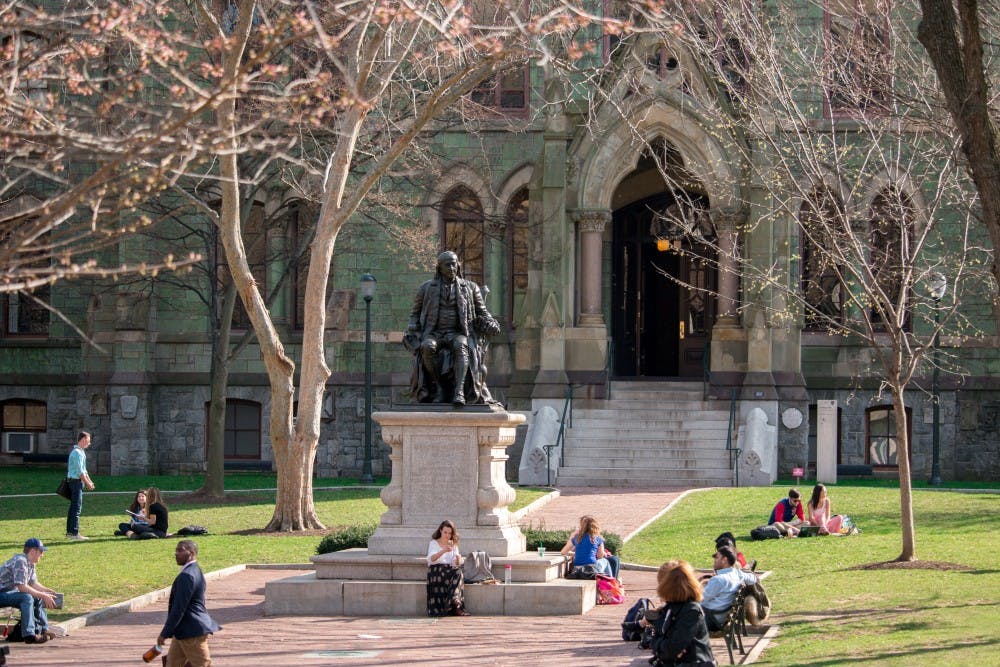
Voting for the Undergraduate Assembly opened on March 30 at midnight. Results will be announced at 9 p.m. on Friday, April 1.
Credit: Julio SosaIn their final debate on Tuesday night before voting began, Undergraduate Assembly presidential and vice presidential candidates gathered in the Harrison rooftop lounge to debate ways to improve productivity, reform housing and protect the voices of minority groups.
The three vice presidential candidates included Huntsman junior Andrew Gegios, College sophomore Sola Park and College junior Taylor Becker. All three candidates have experience serving in the UA: Gegios was the former UA Secretary, Park is currently the UA Communications Director and Becker is currently a New Student Representative.
The first and only vice presidential debate focused on improving UA Steering meetings, which the vice president is responsible for holding, as well as increasing collaboration and communication between student groups and increasing awareness within the general student body about what the UA is and what it does.
Becker said that “steering is absolutely broken” and that “the UA is a broken culture," arguing that the system is bureaucratic and ineffective in creating unity and results.
Park pointed out the need for greater social bonding between the different groups within Steering, and Gegios used his three years of experience serving on UA to say that “I’ve seen the good, the bad, and now I come with a plan for revamping meetings and incentivizing [Steering] attendance.”
The candidates also discussed the UA Annual Report and its lack of follow-up and completed projects. As former secretary, Gegios was responsible for bringing back the report for the 2014-15 school year, which had not been released since 2011. He cited this as his biggest accomplishment on UA and said that it gives transparency to students and administrators and holds members accountable.
The presidential debate then followed, featuring College junior Ray Clark, Engineering junior Ahmed Mohieldin and College junior Kat McKay. Clark is the current UA vice president, McKay is the current UA Treasurer and Mohieldin sits on UA Steering but not on the UA Executive Board.
Topics included assessing whether Penn has enough communal spaces for students and whether the University should expand the number of four-year college houses.
Clark said he supports creating more four-year college houses as long as the University matches it with lower housing costs, which currently play a large role in students’ decisions on whether or not to move off-campus.
Mohieldin added that “students should be able to have as much choice as possible” and McKay cited her own positive experience living off campus to say that she sees “no issue with [upperclassmen] moving off campus.”
The recent decision to not include the Asian Pacific Student Coalition in next year’s University Council was also brought up as candidates discussed the necessity of representing minority groups at Penn.
Candidates affirmed the need to ensure that minority voices are included but McKay also pointed out that each of the four schools should have representation in the University Council, even if this means that it might take away seats from minority student groups.
Unlike Clark and McKay, Mohieldin is not also running as a regular UA representative; thus if he loses the presidency, he will not be serving in the UA at all. He defended his decision by once again critiquing the UA culture as “broken,” explaining that the best way to achieve his goals is through the presidency.
Voting opened on March 30 at midnight and results will be announced on Friday, April 1 at 9 p.m.
The Daily Pennsylvanian is an independent, student-run newspaper. Please consider making a donation to support the coverage that shapes the University. Your generosity ensures a future of strong journalism at Penn.
DonatePlease note All comments are eligible for publication in The Daily Pennsylvanian.




